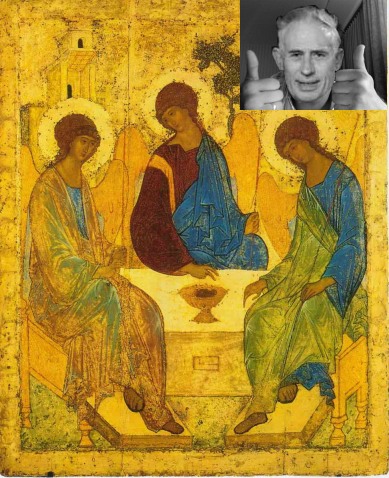podcast 164 – On Counting Gods
The terms “atheism,” “monotheism,” and “polytheism” seem straightforward enough… BUT important ambiguity lurks in the root term “theism.”
The terms “atheism,” “monotheism,” and “polytheism” seem straightforward enough… BUT important ambiguity lurks in the root term “theism.”
Last time, c. 1998-2001, I was a social trinitarian along the lines of Richard Swinburne. While I was on the job market in 1999-2000, my former professor Stephen T. Davis was kind enough to invite me and a friend to attend the Incarnation summit, a follow up to the earlier interdisciplinary Trinity Summit. This was a great privilege, and I pretty much just observed. But… Read More »the evolution of my views on the Trinity – part 6
An appealing theological option which is neither Nicene nor “Arian”?
Richard Swinburne was a visiting fellow at Biola University’s Center for Christian Thought in the Fall of 2012. Here are the videos they’ve posted from that visit. Interestingly, they seem to have avoided the topic of Swinburne’s Trinity theory – at least, judging by the videos they posted. One has to wonder why. Maybe they just wanted to leave room to discuss the soul, about which… Read More »Swinburne @ Biola
Richard Swinburne is one of the greatest living Christian philosophers, who has made immense contributions to philosophy of religion and philosophical theology. It is only idolatry of the past that prevents people from seeing him as great a Christian intellectual as Origen, Augustine, Aquinas, or Leibniz. In my view, he’s plainly a better, clearer, more well-rounded philosopher than any of them. “A prophet is honored… Read More »Is God a Self? – Part 7 – Swinburne
![]()
Swinburne isn’t what you’d call a theological liberal. He’s not a conservative evangelical either, given his rejection of things like biblical inerrancy. He was, I believe, a life-long Anglican, until 1996 when he converted to Eastern Orthodoxy. As I understand it, at least part of his motivation was his exasperation with anything-goes style Anglicanism (e.g. priests who are not theists). But my point is that he aims to be a “Catholic” Christian, in the sense of one who holds to mainstream orthodoxy – roughly, that core of doctrines held in common by Catholicism, Eastern Orthodoxy, and (at least in theory) most Protestants. (Actually, he’s probably a good bit more “Catholic” than that – in that he believes in apostolic succession, and in the authority of The Church to decree the meaning of scriptural texts – see his book Revelation.) This requires some dexterity on his part, and creates the burden of crafting a theory that one can claim fits with the “Athanasian” and Constantinopolitan Creeds.
Swinburne argues that it is uncharitable to read the ecumenical councils’ claim that “there is only one god” as asserting that there’s only one divine individual, as that would contradict their committment to there being three divine individuals.Read More »Swinburne’s Social Trinitarian Theory, Part 2 – a key move
 The theory, then, is that God is an everlasting, temporally extended thing with three temporal parts, each of which is a god. But, they’re the same god as God. Yet as we saw last time, how can the Three be gods at all, as each exists at some times but not others?
The theory, then, is that God is an everlasting, temporally extended thing with three temporal parts, each of which is a god. But, they’re the same god as God. Yet as we saw last time, how can the Three be gods at all, as each exists at some times but not others?Without going into the arguments for this controversial thesis, Baber appeals to the claim made by Derek Parfit and others, that “identity is not ‘what matters’ for survival”. (p.6) Thus, a future thing can count as my surviving, though it is not (numerically) identical to me.
Suppose (I’m stealing this thought experiment from Richard Swinburne) some mad scientists, such as Pinkie and the Brain, are going to cut my brain in half, and put the left half in one body, and the right in another. The body which gets the left half will be tortured to death, while the body getting the right half will be given lifetime passes to all NFL games and a lifetime supply of good beer. If I’m to undergo this experiment, I want to know which of these resulting people will be (numerically identical to) me: the unlucky one, the lucky one, or neither.
Baber (following Parfit) wants to say that depending on how exactly the resulting people are related to me, both may count as the continuation of or survival of me. Specifically, she suggests that psychological continuity is enough – it is enough that the later people have the same or nearly the same beliefs, desires, and so on that I have.
I don’t think this is right, but back to the Trinity: In her view, the god which is a God-stage (temporal part of God) called the Father would, just before the Incarnation, be mistaken to think Read More »“Sabellianism Reconsidered” Considered – Part 4
I’m very pleased to introduce Joseph Jedwab, who has some interesting comments on Moreland’s and Craig’s understanding of the Trinity. I haven’t had the privilege of meeting him, but given how he spells “center”, I gather he’s English. 🙂 Joseph is currently teaching philosophy and finishing his dissertation at Oriel College of Oxford University, on the metaphysics of the Trinity and the Incarnation. And he’s working under the supervision of one of the greatest living philosophers of religion, Richard Swinburne. Hiring committees take note – he goes on the job market next year! – Dale
I agree this is a clear account. I’m a bit worried about how the discussion might influence terminology. Moreland and Craig describe their view as Social Trinitarian and contrast this with an Anti-Social Trinitarian view. This is a mistake. Leftow’s title indicates his paper is against Social Trinitarianism (ST). It’s not supposed to be the name of a Trinitarian view. As you know, the name of the view Leftow defends is ‘Latin Trinitarianism’ (LT). Further, they say that the main commitment of ST is that there are three centres of consciousness, but it’s not clear what a centre is.Read More »Guest Post: Jedwab on “Trinity Monotheism”
In this series of posts, I’ve been discussing the view of Arius that the Son is created from nothing, and the view of Athanasius that the Father begets the Son. All of this illustrates two basic issues that any classical account of the Trinity has to face when it tries to explain how one divine person produces another. First, we need to think carefully before… Read More »Arius and Athanasius, part 11 – General questions about divine production (JT)
I see trends in this analytic theology literature somewhat towards relative identity theories, and towards “metaphysical madness.”
To fully understand a philosophical theory, one needs to understand not only the content of it, but the reasons for which it is held. This is why I’m patiently going through how Moreland and Craig reject what they see as the competing Trinity theories, before giving their own.
As we’ve seen, they consider themselves to be “social trinitarians” (last time we looked at their rather vague definition of that term). They then adopt Brian Leftow’s taxonomy of social trinitarian theories, and decide that the first of these is the most promising. Read More »Trinity Monotheism Part 3: Their Set-Up, Part 2

Swinburne sez: Two thumbs up for the social analogy!
Richard Swinburne is an Emeritus professor at Oriel College, Oxford University, and is widely considered one of the greatest living Christian philosophers. He’s done original work in philosophy of science, epistemology, philosophy of mind, and general metaphysics, but is perhaps best known for his work in philosophy of religion and philosophical theology. He has a way of squarely facing tough issues, and treating them in original and principled ways. He’s particularly well known by philosophers for his arguments for mind-body dualism, for his cumulative case for the existence of God, and for his bold social trinitarian theory, which I’ll cover in this series. Read More »Swinburne’s Social Trinitarian Theory, Part 1
 Last time I tried to analyze Richard’s argument in ch. 22 that his view preserves monotheism. This time, I critically evaluate the argument. Is it sound?
Last time I tried to analyze Richard’s argument in ch. 22 that his view preserves monotheism. This time, I critically evaluate the argument. Is it sound?
It goes like this:
What shall we make of this argument? Why believe premise 1? Richard says,
…if it is agreed that omnipotence can do everything, it will be able to carry out with ease what any other power would not be able to do. For this reason it is clear that only one omnipotence can exist. (ch. 22, p. 394)
I have a couple of problems with this. Read More »Richard of St. Victor’s De Trinitate, Ch. 22 – part 2 (Dale)
Is “monarchical trinitarianism” theologically viable?
In this episode I respond to the interesting article “What about This View? How to Defend an Anti-Trinitarian Theology,” by evangelical apologist Dr. Robert M. Bowman Jr.
Thanks to Rob Bowman for his thoughtful reply to my previous post regarding the Shema and his argument with Sir Anthony Buzzard. While I sided with Mr. Bowman regarding the meaning of the Shema (as saying that YHWH is unique – who which only presupposes, but doesn’t assert that he is a god), I think Buzzard is correct that ancient Jews thought that YHWH was… Read More »a reply to Robert Bowman on biblical monotheism, the Trinity, and the Shema
Our friend Fr. Aiden has responded to my post defending analytic theology (and analytic theologians). This bit, I think, advances the discussion: …my concern is not false teaching per se but the subjection of God’s self-revelation as Father, Son, and Spirit to the quest for philosophical precision. And this brings me to the heart of my concern. As far as I can tell, the theological… Read More »more on despising analytic theologians
Three Christian philosophers on perfect being theology, tradition in philosophy going back to the great medieval philosopher Anselm of Canterbury (d. 1109), but really, as Leftow has shown, back to Augustine, Plato, and the Christian Bible. First, a great interview (click the thin blue button) with Oxford philosopher Brian Leftow by Robert Lawrence Kuhn, for the PBS should Closer to Truth. I did not know that Leftow was… Read More »Is God Perfect?
 Philip Clayton teaches theology and philosophy at the Claremont School of theology, and at the Claremont Graduate University.
Philip Clayton teaches theology and philosophy at the Claremont School of theology, and at the Claremont Graduate University.
He publishes a ton, and much of his work is in the science and religion genre. Unlike many authors in that genre, Clayton isn’t a scientist – his training is in theology, religious studies, and philosophy.
He’s also a co-founder of this Big Tent Christianity project, which aims in his words “to foster a radically different understanding of the heart of Christian faith” – different, that is, from the theologically and culturally conservative and liberal camps.
But our question is: Is God a self? What saith Clayton? Check out his interview (blue button), and then click here for my take -> Read More »Is God a Self? Part 3 – Clayton
 Three World Vision employees are fired because according to World Vision they don’t believe in that Jesus is “fully God” or that he’s a member of the Trinity.
Three World Vision employees are fired because according to World Vision they don’t believe in that Jesus is “fully God” or that he’s a member of the Trinity.
But inquiring minds want to know: what did they believe, what statement or statements of faith did they sign, and are the beliefs therein necessary and sufficient for being a real Christian? This time, we’re digging a little deeper.
Their website saith,
World Vision U.S. hires only those who agree and accept to its Statement of Faith and/or the Apostles’ Creed. (source)
Interesting! Note the “and/or” – employees must affirm either one or both. As we’ve noted before here at trinities, nothing in the so-called Apostles’ Creed requires belief in either the “full deity” of Christ (whatever that may mean) or any sort of trinitarian theory.Read More »No Trinity, No Job – Part 2